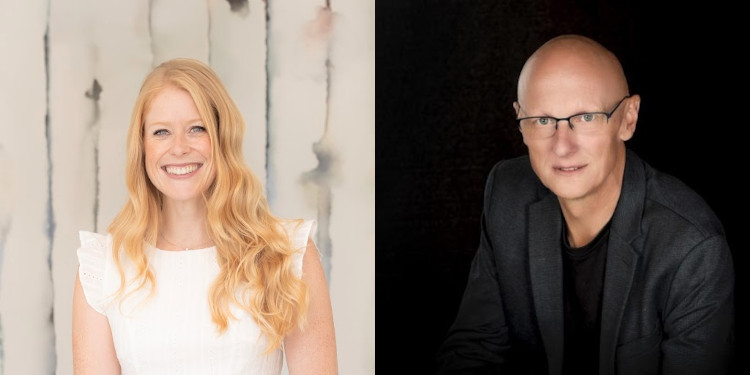
Relocating from the UK to the US is more than a change of address—it's a shift in culture, language, and daily life. David and Ginge, co-leaders of Brits of Compass, know that firsthand. In this interview, they share their journeys, the story behind the group, and how shared experiences help them support others making the same move.
Can you each tell us a bit about your background? Where you're from in the UK and what brought you to the US?
David: London and the Home Counties. Definitely a South East England kid, as parents (both Londoners) did their best to bring me up in the English countryside but with many, many trips and stays in 'town'. It gave me the best of both worlds. I ended up moving back there. A drama student at Guildhall School of Music and Drama (backstage, not front) went through the Royal Shakespeare Company to the West End, to London Contemporary Dance, ending up in television at the BBC and ITV. That's where, while location managing, I started to have an interest in real estate. When I left TV in 2003 and moved to Arizona, my father-in-law was a real estate broker. I dived straight into it and haven't looked back in 22 years.
Ginge: I was born in Lytham St Annes and spent most of my early years working in London at Innocent Drinks. I went on holiday to Austin, Texas, and happened to meet my now husband! I moved 18 years ago and have lived in LA, NY and now NJ.
What were your first impressions upon arriving in the US, and how did they compare to your expectations?
David: My first trip to the US was staying in a friend's loft in Soho in 2003. They weren't there. They just gave me keys in London and said to bring the keys back, don't trash the place, and have fun. I was 22. Baptism of fire! NYC was exactly as expected. A little on the edge, a little dangerous in a way I hadn't experienced in London, but totally familiar as an inner city where I'd already spent a lot of my life. I'd lived in a squat in “Murder Mile” just south of The Elephant and Castle. Good prep. Raw energy. Lots of it. Loved it. The next year, I came to Duke University with the London Contemporary Dance Theatre, then over to LA, where we were part of the Arts Festival opening the 1984 Olympics. Such a contrast in less than 12 months. It was all straight off the TV screens and dramas I'd seen growing up.
Ginge: I loved the US from my very first trip when I was 18. I spent a summer working at the Statue of Liberty gift shop and then spent a semester studying at UT Austin. I loved (and still do love) the positive energy of the Americans + the open and honest communications. Plus 25+ types of everything at the supermarket! David, what drew you to join and later co-lead the group?
Ginge. She's a force of nature, and we work really well together. Apart from that, it's an amazing group, and we are lucky to have met everyone. In your darkest, loneliest real estate hour, there's always humour. Honesty in a very British way. It's soul food. Total privilege to co-lead this gang of misfits.
Ginge, what inspired you to create Brits of Compass, and what gap did you see in the market?
I started meeting amazing British agents across the USA and wanted to bring us all together. There is something wonderful and unique about the Brits that you can't replicate—the humor, sarcasm, and the passion for many British things! I saw an opportunity to create a network of British agents, both to collaborate and be of service to other agents and clients, making a move.
How has the network evolved since it began in 2022?
David: We've grown and evolved into a more business-oriented group, in addition to arguably the best affinity group in CØMPASS. Our press, social media, and website give everyone more opportunities and a chance to celebrate our identity. Makes it easier for other Brits and foreign nationals to find us.
Ginge: We have grown from around 6 members to 50 and in 2024 did $750 million in transactions.
What makes real estate such a complex experience for Brits relocating to the US?
Actually, it's the opposite. It's an insanely simple experience compared to buying or selling a home in the UK. But that said, it's very very different. Add to that the language, measurements (we're not metric here), the state-to-state differences, and speed. It's just an entirely different experience. Sometimes, some straightforward British honesty can go a long way after a confusing and fast-moving day.
How do you tailor your services to meet the specific needs of British clients?
Simply being one of them. Familiarity. Being instantly at ease. Sometimes, it is the comfort of not having to translate (there really are two languages) and being able to sit down over a cuppa. Chat through the differences, and have a little fun doing it. Bring them some Cadbury's chocolate. Although in AZ, that usually melts.
Brits of Compass isn't just about homes; it's also about helping British companies expand into the US. Can you walk us through how that support works?
Really no different than any corporate move. Except, you have the unique ability to understand how much of a change it will be for the Brits involved. We've all been there and taken the journey. As with much of this journey, it's not about hand-holding but giving the best advice possible. Our secret weapon is being able to smooth the ride. Make real-world comparisons that our British clients will understand. Dispel the myths from firsthand experience. Unless you've lived in both countries, you're not equipped to do that.
How important is it to understand the “human side” of relocation, as opposed to just the legal and logistical side?
Understanding the human side of relocation is the most critical thing. It's amplified 100% when someone isn't just moving from state to state but moving from culture to culture. Almost speaking the same language is really the only similarity we have. It's very useful, but the different cultures can be a bigger shock than expected.
Ginge, how do you tailor your services to meet the specific needs of British clients?
We have vendors that specifically help with aspects of an international move, such as relocation consultants, currency experts to help people move money, lawyers, tax advisors , etc.
What kind of community have you cultivated among the 50+ members of Brits of Compass?
David: Friendship. Honesty. Fun. Business. Probably in that order. A daily dose of familiarity that makes the day go better than it might have without it. The ability to just be you, without translating, and know you'll be safe.
Ginge: We have an amazing community that supports each other both personally and professionally.
How do shared culture and language shape trust and collaboration within your network?
David: We all share the same reference points. We know and recognise each other because we have the same beginnings.
Ginge: The shared understanding and values help us connect on a really wonderful level.
What advice would you give to a Brit who's about to move to the US for the first time?
David: Talk to one of us. To friends you have over here. More than one. We're all individuals, and it's important to hear different points of view in your language from someone who's taken the journey. As Brits, I think we make the mistake of seeing America as one country. Each state is so different, it's more like looking at Europe, except they all (almost) speak the same language.
Ginge: Take time to find where you want to be/live. Community is so important with such a big move. Find experts to help you navigate. Don't be afraid to ask for help!
On another note, tea or coffee?
David: Tea.
Ginge: TEA Always!
Favourite British comfort food in the US?
David: Fish and chips.
Ginge: Crumpets when I can find them.
Most American habit you've accidentally adopted?
David: Always saying 'I'm great, thanks' when asked how you are in every opening sentence.
Ginge: Sometimes, not using a knife to eat meals, horrifying.
A British phrase that always gets confused stares in the US?
David: You alright?” which is a slang hello. Americans can take it literally…
Ginge: All of them LOL. "Let's have a chinwag" tends to draw the most confused looks.



















